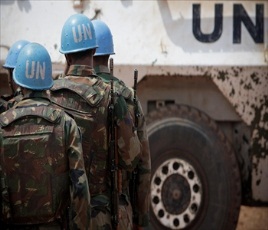Increase of UN troops in Abyei is part of a previous agreement, Sudan says
May 18, 2013 (KHARTOUM) – Sudan’s foreign ministry has stated that the call of the UN secretary General for adding (1126) troops to the UN Interim Force for Abyei (UNISFA) came in the context of an earlier agreement between Sudan and South Sudan and the UN.

The UN chief asked the Security Council to increase the UNISFA bt 1126 personnel saying it will strength the effectiveness and efficiency of UN Peacekeeping.
The mission which is initially had to monitor the security situation in Abyei is now also tasked with the security situation in the five disputed area forming the buffer zone on the border between the Sudan and South Sudan.
The foreign ministry’s spokesperson, Abu-Bakr Al-Siddiq, on Saturday said however that they haven’t officially received the request of the Secretary-General to increase the number of troops.
He further added they consider the move as part of the previous security agreement which stipulates that protection of the demilitarized zone including Abyei area is part of UNISFA’s mandate.
The UN Secretary General has pointed out that Abyei area is experiencing increasing tension between the Dinka Ngok and Misseriya, saying these groups are still armed, and exchanging hostility and suspicions.
The existing UNISFA is comprised of 3973 troops; most of them are Ethiopians, while its troop strength authorized by the UNSC is 4,200 soldiers.
The report said that “the remaining 227 troops will be deployed within the air aviation unit, as military observers, staff officers and as part of the Joint Border Verification and Monitoring Mechanism”.
The killing of the Ngok Dinka Paramount Chief and UNISFA peacekeeper on 4 May increased the tension in the disputed area.
The two sides at the level of Abyei Joint Oversight Committee recently decided to make Abyei a “weapons-free area” as per the 20 June 2011 Agreement and that all perpetrators of criminal acts be brought to justice, by traditional or by formal means.
Moon further said that the delay of the referendum undermines efforts to maintain security and ensure stability of the humanitarian situation, stressing that it is the duty of Khartoum and Juba prevent unauthorized armed individuals from entering Abyei.
An Abyei referendum initially scheduled for January 2011 was due to decide the fate of the area but disagreements between the ruling parties of Sudan and South Sudan over who was eligible to participate has led to a stalemate.
The African Union tried to break the deadlock last year, proposing that the plebiscite go ahead in October 2013, but only for those permanently residing in the area – effectively excluding the Misseriya nomads, leaving the Southern-aligned Dinka Ngok free to vote in favour of joining South Sudan.
Khartoum has rejected the plan, but AU mediators stress the exclusion of the Misseriya nomads is consistent with the decision of the International Court of Arbitration in July 2009, which defined Abyei’s territory as the nine Ngok Dinka chiefdoms.
(ST)
